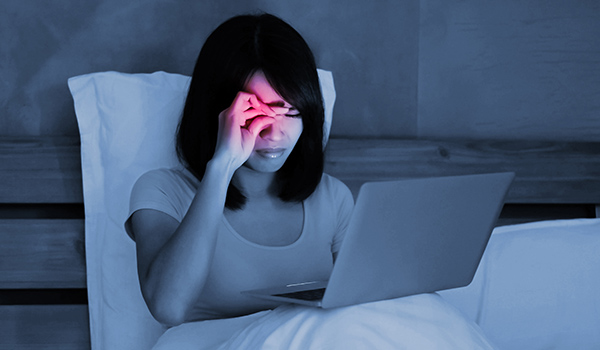
Is the light from your computer, your cell phone and tablet keeping you from falling into a fitful sleep? There is research that suggests this is the case. Most of the light that comes from your electronic devices fall in the blue range of the light spectrum and so you will regularly hear people refer to it as “blue light”. Before the advent of all our electronic devices, we got most of our blue light from the sun. This signaled your body’s internal clock that it was daytime and allowed people to stay awake and focused during the day.
Night was spent in relative darkness and this naturally “told” our bodies that it was time to sleep. We’ve come a long way since those days. Nowadays, we have 24/7 access to the light that was supposed to signal “daytime” and keep us awake.
It’s therefore no wonder that researchers have reported that blue light may have a negative effect on a person’s sleep pattern. In fact, blue light can prevent the body from secreting melatonin. Melatonin is a natural hormone that allows you to fall and stay asleep.
There is also new data, that disrupting the body’s internal clock or circadian rhythm with blue light can increase blood sugar levels which could ultimately lead to diabetes. The research in this area is still new and on-going. However, the data points to how detrimental over-exposure to blue light can be.
Technological advancement is good for us. But how do we stop it from affecting our health adversely? In this post, we’ll go over practical steps you can take to keep blue light from wrecking your health.
Blue light and your health
For people who work in the daytime
If you work during the day, here are some quick tips for reducing your exposure to blue light.
- Take a 5-10 minute break from looking at your computer at least once an hour. Walk around your office. Climb the stairs or just change your environment. This will improve your level of physical activity throughout the day, especially if you’re busy. And it will give your eyes a break from the computer.
- If you tend to sit at your computer for longer stretches of time, you might want to consider wearing blue light blocking glasses as you work through the day. Blue light blocking glasses are non-prescription glasses that you can wear to protect your eyes. The research jury is still out on whether these are completely effective but there are individual reports of improved sleep and less eye-strain for people who use them. It doesn’t hurt to try them.
- Apart from blue light blocking glasses, there are blockers for your computer screen that you could use to reduce your exposure to blue light.
- If you tend to read eBooks at night, consider switching some of those up with physical books. Yes, those things that only now seem to exist in libraries and book-stores; try reading those instead. Same goes with documents you may need to read on your computer-if possible print them out and read the physical copies instead.
- At night, consider using dimmer lights in your bedroom. Too much light may still be signaling to your body that it is daytime which then makes it difficult to fall asleep.
- Consider a night-time routine that involves turning off all your electronic devices at least one hour before bed. (And if you really think about it, that email that was sent at 10 pm at night can wait until morning.)
For people who work at night
For people who work at night, in addition to the tips above, you might also want to consider the following.
- Falling asleep during the day can be very difficult because of the sun’s rays. Once you get back from work, avoid exposing yourself to more blue light. Instead, turn those devices off and create a “night-time” atmosphere for yourself. This may require things like taking a hot shower or perhaps drinking some calming tea.
- Draw the curtains in your room together.
- Turn off all light sources (lamps etc.) and all your electronic devices so you can get the rest you need.
Digital addiction and mental health counseling
Are there apps or games that you tend to get sucked into your electronic devices? Consider deleting them. And if you’re having real trouble breaking the habit because you’re severely addicted to your phone, you might want to speak with a counselor to help you.
Whatever the case might be, it is possible to keep blue light from destroying our sleep and health. If you enjoyed this post, consider sharing it with someone else.

